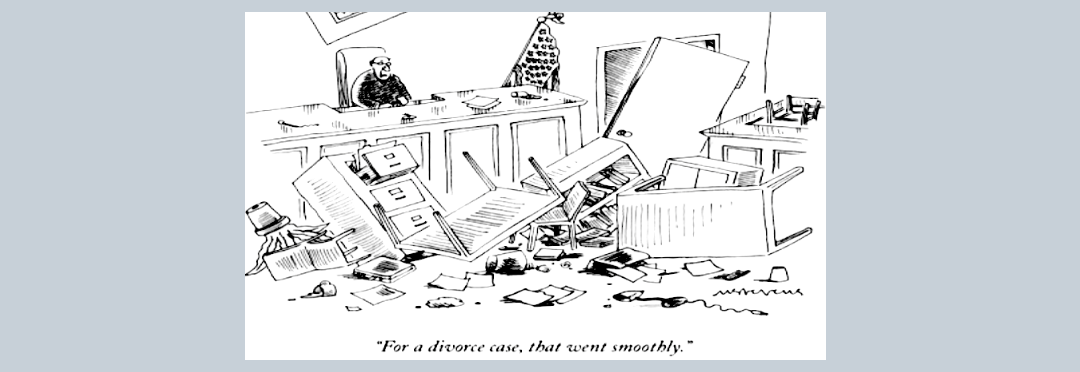From my vantage point as a family law practitioner I found it difficult to watch two particular elements of Marriage Story. The first was the film’s legal inaccuracy relative to moving a child from one state to another, and the other was the all-too-accurate representation of the courtroom litigators.
A child is a resident of a state when he has lived there for six months or longer (less if an infant and under six months of age). When parents are divorcing if one parent wants to remove a child from their resident state and the other parent does not, the removing parent needs to seek permission from the Court in the state where the child resides. Therefore when Nicole removed their son, Henry, to California and filed a lawsuit for divorce in that state she created the possibility of a venue dispute, as Charlie had legal standing to file in New York. So although Nicole’s lawyer told Charlie he was required to hire California legal counsel to answer her complaint, he could and arguably should have answered the complaint in California and simultaneously filed a complaint in New York claiming New York was the proper venue to hear the parties’ divorce and removal case. I understand that perhaps the writers wanted the story to unfold in California, but it would have been more legally accurate and realistic if Nicole had filed in New York seeking to remove Henry to California. Nicole had a reasonably strong case in that she and Charlie had married in California and Henry was born there. Nicole was seemingly Henry’s primary caretaker, had extensive family and other contacts in California, and she had already received an offer to act in a pilot television show there. The reason the shortcut solution to that part of the plot irked me was that it left non-lawyers with misconceptions about the realities of interstate custody disputes. This was made evident to me when watching the film with my non-lawyer friend she asked me if Charlie really needed to retain a California lawyer. The short answer was yes, he had to retain California counsel in order to respond to her complaint; but the full answer was that he could, and perhaps should have simultaneously hired New York counsel and filed in New York.
As much as I found the legal inaccuracy frustrating, I found the nearly perfect posturing of the courtroom litigators to be more disturbing. When Charlie fires Burt–his low-key, perspective-laden, semi-retired, conciliatory lawyer (played by Alan Alda) — and “lawyers up” with a hard-hitting litigator to match Nicole’s fierce warrior of an attorney (played by Laura Dern), Nicole screams at Charlie “You shouldn’t have fired Burt” to which Charlie retorts: “I needed my own asshole”. Before Charlie had gotten to the point of feeling like he needed to replace Burt with tougher counsel, Burt had been trying to offer Charlie perspective in saying “we should consider what will happen if we go to Court, but not to worry we won’t go to Court” to which Charlie had said “Are you aware of how maddening you sound?” Charlie then mused further saying that he felt like a criminal, to which Burt said “you didn’t commit any crime”. Charlie aptly replied “I still feel like a criminal.” That my friends is a broken process.
As I began to write this blog post I went online to see what other people were writing about the film and was dismayed to find lawyers seemed to be lining up to agree with the truthfulness of the portrayal without seeming to reflect upon or be disturbed about the impact their behaviors had on their clients and their clients’ children- See Celebrity Lawyer Interview- “Holy Crap… do we come off like that?” This point is brought home in the film when in reference to the process Charlie says to Burt “it seems ridiculous”. Burt immediately responds saying “Oh, it is”. Yet the illogical progression of the system marches on, based more on historical precedent and a business model that works for lawyers than current legal, financial and psychological needs of families. It’s not that I think Courtrooms are unnecessary or that there aren’t times and situations when Judges and the traditional process are a family’s best option, but it’s not the majority of families that benefit from the use of a Courtroom as the backdrop and context to reframe their lives. Personally, when I realized the long-term negative impact the traditional divorce process often created for generations of families, I felt compelled to try and create something more effective; the Consilium® Process became the antidote, my attempt to intervene in a considered way so that families could restructure effectively and productively.
When I think about the upheaval families undergo in a divorce, it seems much like the disruption of a hurricane, which is why I suppose I’m reminded of the slogan that became popularized in 2005, soon after Hurricane Katrina: ReBuild, ReStore, ReNewOrleans. If instead of thinking of divorce as a battle to be won and we as lawyers the warriors to win it, what if instead we saw ourselves as counselors who helped families reframe – legally, financially and emotionally – in the aftermath of a very great storm: ReBuild, Restore, ReStructureOurFamily.
(781)259-1500
info@ConsiliumDivorce.com

